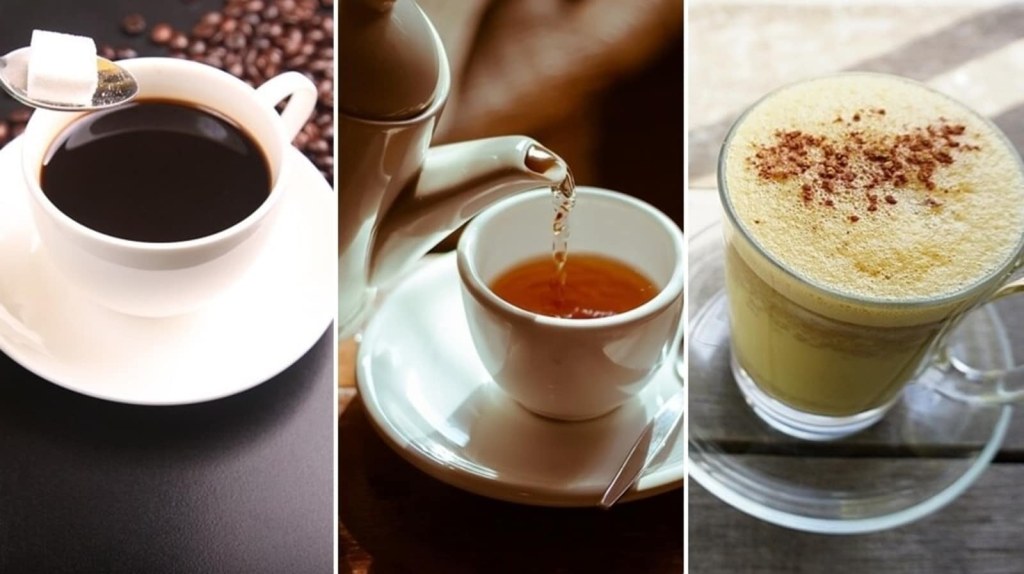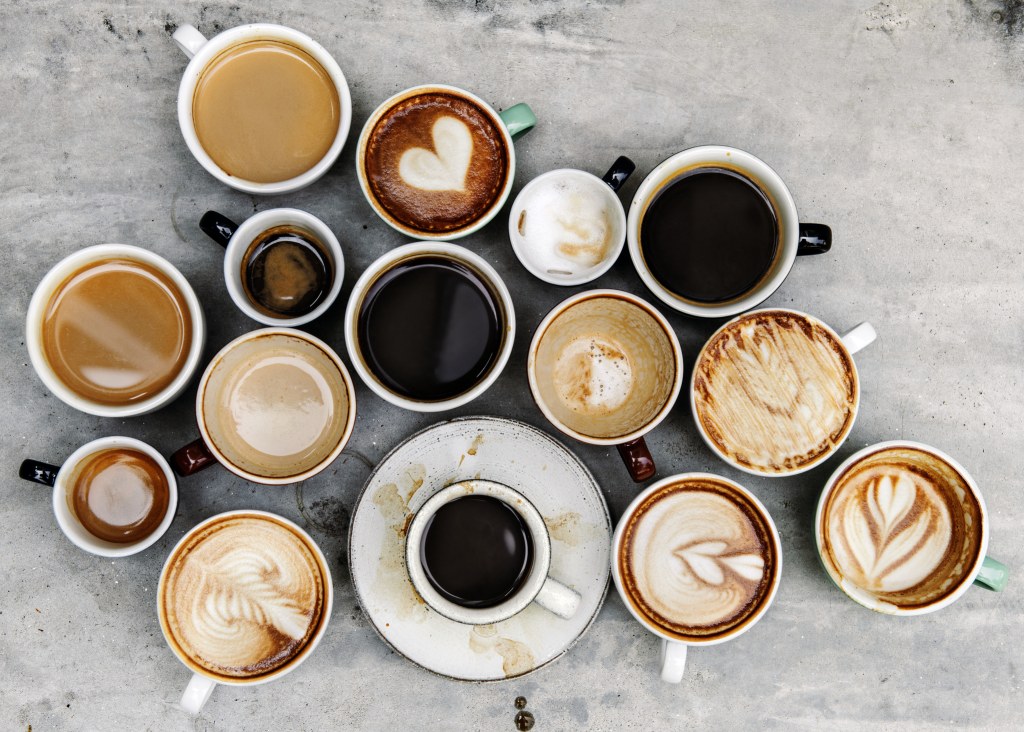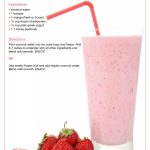What Are Warm Beverages? Discover The Ultimate Guide And Satisfy Your Cravings Today!
What Are Warm Beverages?
Warm beverages, also known as hot drinks, are liquids that are consumed at a higher temperature than room temperature. These beverages are often enjoyed for their comforting and soothing effects, especially during colder seasons or when one is feeling under the weather. Warm beverages can be made using various ingredients, including water, milk, tea leaves, coffee beans, herbs, spices, and more. They come in a wide range of flavors and can be enjoyed plain or with added sweeteners and flavorings.
Introduction
Hello Readers,
2 Picture Gallery: What Are Warm Beverages? Discover The Ultimate Guide And Satisfy Your Cravings Today!


Today, we will explore the wonderful world of warm beverages. As the colder months approach, there’s nothing quite like curling up with a hot drink to warm your body and soul. In this article, we will delve into the origins of warm beverages, their various types and flavors, the benefits and drawbacks of consuming them, and more. So, grab a cup of your favorite warm beverage and let’s dive in!
What Are Warm Beverages?
Warm beverages are liquids that are served at a higher temperature than room temperature. They can be made using a variety of ingredients, such as water, milk, tea leaves, coffee beans, herbs, and spices. These ingredients are often heated to release their flavors and create a comforting and enjoyable drinking experience.
Some of the most popular warm beverages include coffee, tea, hot chocolate, mulled wine, and herbal infusions. Each of these beverages has its own unique taste and aroma, providing a wide range of options for those seeking a warm drink.
Types of Warm Beverages:

Image Source: hindustantimes.com
1. Coffee: Coffee is a popular warm beverage made from roasted coffee beans. It is known for its rich flavor and energizing effects. Coffee can be enjoyed black or with added milk, sugar, or other flavorings.
2. Tea: Tea is another widely consumed warm beverage. It is made by steeping tea leaves in hot water and can be enjoyed plain or with added milk, honey, lemon, or other ingredients. There are numerous types of tea, including black tea, green tea, herbal tea, and more, each with its own distinct flavor and health benefits.
3. Hot Chocolate: Hot chocolate, also known as cocoa, is a sweet and creamy warm beverage made from cocoa powder, milk, and sugar. It is often topped with whipped cream or marshmallows for added indulgence.
4. Mulled Wine: Mulled wine is a warm beverage commonly enjoyed during the holiday season. It is made by heating red wine with spices such as cinnamon, cloves, and nutmeg. Mulled wine is often served hot and can be a delightful treat on a cold winter evening.
5. Herbal Infusions: Herbal infusions are warm beverages made by steeping herbs, flowers, or other plant materials in hot water. These infusions can have various flavors and health benefits depending on the ingredients used. Popular herbal infusions include chamomile tea, peppermint tea, and ginger tea.
Who Drinks Warm Beverages?

Image Source: betterretailing.com
Warm beverages are enjoyed by people of all ages and backgrounds. Whether you’re a coffee enthusiast, a tea lover, or someone who simply enjoys a comforting cup of hot chocolate, there’s a warm beverage for everyone.
Warm beverages are often consumed in the morning to kickstart the day or in the evening to unwind and relax. They are also popular during social gatherings, where they provide a warm and inviting atmosphere. Additionally, warm beverages are often consumed when one is feeling under the weather, as they can provide comfort and help alleviate symptoms.
When Are Warm Beverages Consumed?
Warm beverages can be enjoyed at any time of the day. Many people choose to start their mornings with a cup of coffee or tea to help wake up and energize. Warm beverages are also often enjoyed during breaks throughout the day, providing a moment of relaxation and comfort.
In colder seasons, such as fall and winter, warm beverages are particularly popular as they help to keep the body warm and provide a comforting sensation. They are also commonly consumed during festive occasions and celebrations.
Where Can You Find Warm Beverages?
Warm beverages can be found in a variety of settings, including coffee shops, tea houses, restaurants, and even in the comfort of your own home. Many people choose to brew their own warm beverages using ingredients readily available in their kitchens, while others prefer to visit specialty establishments to enjoy a wider range of flavors and varieties.
Regardless of where you choose to enjoy your warm beverage, the experience of sipping on a hot drink is always a delightful one.
Why Are Warm Beverages Popular?
There are several reasons why warm beverages have gained popularity worldwide:
1. Comfort and Relaxation: Warm beverages have a soothing effect on the body and mind. The warmth and aroma can provide a sense of comfort and relaxation, making them an ideal choice for unwinding after a long day or during stressful times.
2. Flavor and Variety: Warm beverages come in a wide range of flavors and varieties. From bold and robust coffee to delicate and fragrant teas, there is something to suit every taste preference.
3. Health Benefits: Many warm beverages, such as herbal teas, are known for their potential health benefits. They can help to boost the immune system, aid digestion, promote relaxation, and provide antioxidant properties.
4. Socialization: Warm beverages often serve as a catalyst for social interaction. Whether meeting friends for a coffee date or hosting a tea party, warm beverages create a warm and inviting atmosphere that brings people together.
5. Tradition and Ritual: Warm beverages have been a part of cultural traditions and rituals for centuries. From the Japanese tea ceremony to the British afternoon tea, warm beverages hold a significant place in many societies and symbolize hospitality and connection.
How Are Warm Beverages Prepared?
The preparation of warm beverages varies depending on the type of drink. Here are some common methods:
1. Coffee: Coffee can be prepared using various methods, such as brewing with a coffee machine, using a French press, or using a traditional coffee pot. The coffee grounds are combined with hot water, allowing the flavors to infuse.
2. Tea: Tea is typically prepared by steeping tea leaves in hot water. The water is heated to the appropriate temperature for the specific type of tea, and the leaves are then steeped for a certain amount of time to release their flavors. The tea is then strained and ready to be enjoyed.
3. Hot Chocolate: Hot chocolate can be prepared by heating milk or water and adding cocoa powder and sugar. The mixture is stirred until the ingredients are well combined and heated to the desired temperature. Additional toppings, such as whipped cream or marshmallows, can be added for extra indulgence.
4. Mulled Wine: Mulled wine is prepared by heating red wine with spices, such as cinnamon, cloves, and nutmeg. The mixture is simmered for a period of time to allow the flavors to meld together. It is then served warm and can be garnished with citrus slices or spices.
5. Herbal Infusions: Herbal infusions are made by steeping herbs, flowers, or other plant materials in hot water. The water is heated and poured over the ingredients, allowing them to steep for a certain amount of time. The infusion is then strained and ready to be enjoyed.
Advantages and Disadvantages of Warm Beverages
Like any consumable, warm beverages have their advantages and disadvantages. Let’s explore both sides:
Advantages:
1. Comfort and Relaxation: Warm beverages provide a sense of comfort and relaxation, helping to alleviate stress and promote a sense of well-being.
2. Hydration: Warm beverages, especially herbal infusions, can contribute to daily hydration requirements, making them a healthier alternative to sugary drinks.
3. Potential Health Benefits: Certain warm beverages, such as herbal teas and green tea, are known for their potential health benefits. They can support digestion, boost the immune system, and provide antioxidant properties.
4. Variety: Warm beverages come in a wide range of flavors and varieties, catering to different taste preferences and providing a delightful drinking experience.
5. Social Connection: Warm beverages often serve as a social catalyst, bringing people together and creating opportunities for connection and conversation.
Disadvantages:
1. Temperature Sensitivity: Warm beverages need to be consumed at a certain temperature to be enjoyed. If they are too hot, they can cause burns or discomfort.
2. Caffeine Content: Some warm beverages, such as coffee and certain types of tea, contain caffeine. While moderate consumption is generally considered safe, excessive caffeine intake can lead to side effects such as increased heart rate and difficulty sleeping.
3. Staining Potential: Certain warm beverages, such as coffee and red wine, have the potential to stain teeth and clothing if consumed regularly or in large quantities.
4. Added Sugars: Some warm beverages, particularly flavored coffees and hot chocolates, can be high in added sugars. Excessive sugar consumption can contribute to various health issues, including weight gain and dental problems.
5. Individual Sensitivities: Some individuals may have sensitivities or allergies to certain ingredients found in warm beverages, such as lactose intolerance or sensitivity to caffeine or specific herbs.
Frequently Asked Questions (FAQs)
1. Are warm beverages suitable for children?
Yes, warm beverages can be enjoyed by children, but it’s important to consider their specific needs and preferences. Avoid beverages with caffeine, such as coffee and strong tea, and opt for milder options like herbal infusions or warm milk with added flavors.
2. Are warm beverages beneficial for digestion?
Yes, certain warm beverages, such as herbal teas like chamomile or ginger, can help support digestion and ease discomfort. However, individual reactions may vary, so it’s best to consult with a healthcare professional if you have specific digestive concerns.
3. Can warm beverages help with sleep?
Warm beverages like herbal teas, such as chamomile or lavender, are often associated with relaxation and may contribute to better sleep quality. However, it’s important to practice good sleep hygiene and avoid caffeine-containing beverages close to bedtime.
4. Can warm beverages help with cold and flu symptoms?
Warm beverages, like hot water with lemon or herbal infusions, can provide temporary relief for cold and flu symptoms. They can help soothe a sore throat, relieve congestion, and hydrate the body. However, they are not a cure for these illnesses, and medical advice should be sought if symptoms worsen or persist.
5. Can warm beverages aid in weight loss?
Warm beverages alone cannot lead to weight loss. However, certain warm beverages, like green tea, are known to have metabolism-boosting properties. Incorporating warm beverages into a balanced diet and exercise routine may support weight management efforts.
Conclusion
Warm beverages have been enjoyed by cultures around the world for centuries. Whether it’s a steaming cup of coffee to start the day, a soothing herbal infusion to unwind, or a festive mug of mulled wine during the holidays, warm beverages provide comfort, flavor, and a sense of connection. So, the next time you’re looking for a comforting drink, reach for a warm beverage and savor the moment.
Final Remarks
In conclusion, warm beverages offer not only comfort and relaxation but also a variety of flavors and potential health benefits. It’s important to be mindful of individual sensitivities, caffeine content, and added sugars when consuming warm beverages. As with any dietary choice, moderation is key. So, go ahead and enjoy a cup of your favorite warm beverage, but also remember to stay hydrated with water and maintain a balanced diet. Cheers to the joy of warm beverages!
This post topic: Healthy Beverage Recipes



